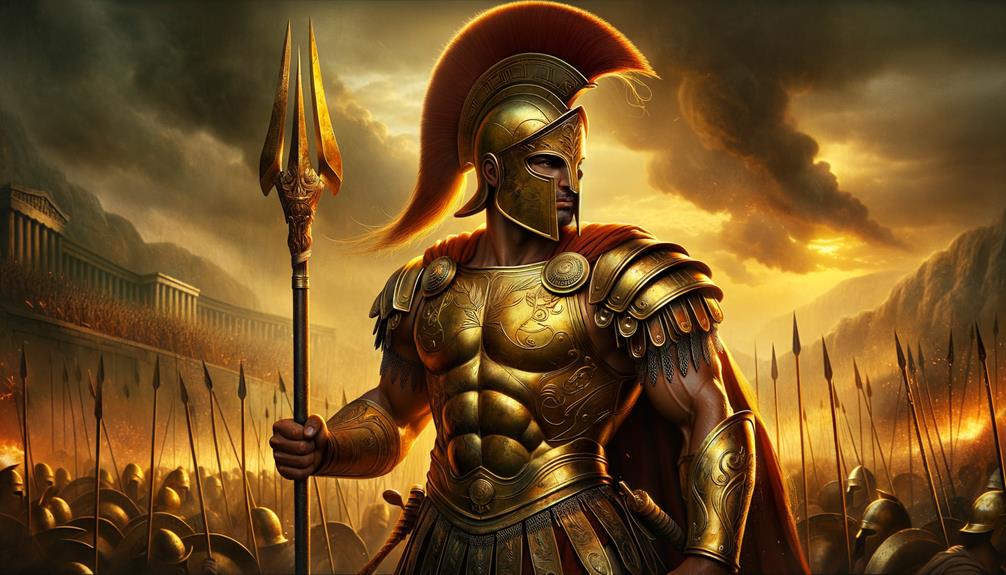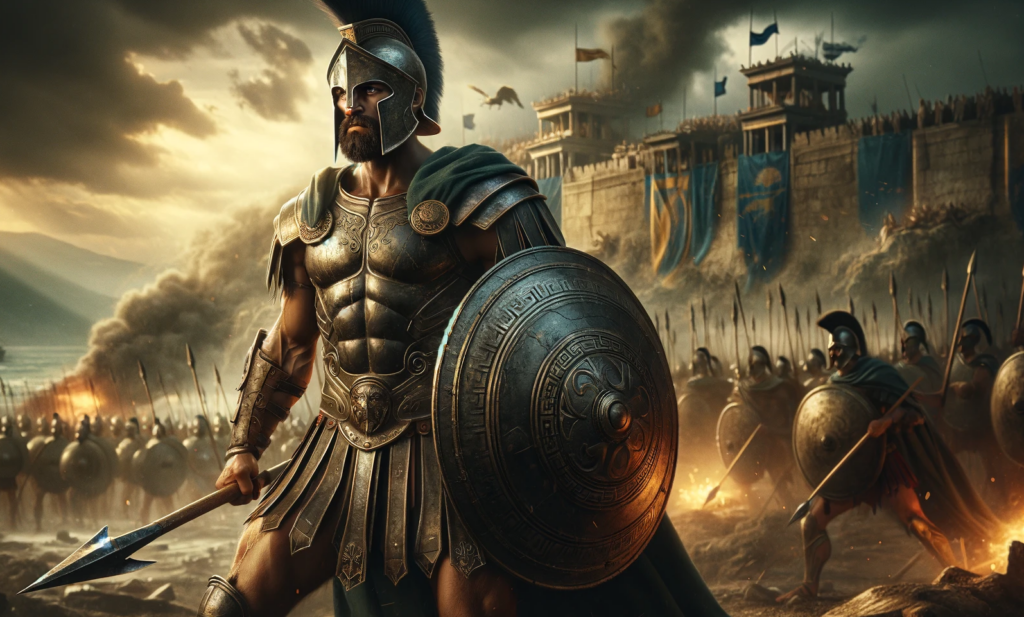The Legend of Achilles
 Achilles, the son of the sea nymph Thetis and the mortal Peleus, is one of the most enduring figures in Greek mythology. Renowned for his unmatched strength, courage, and tragic flaw, Achilles stands as a complex hero whose story continues to resonate across millennia.
Achilles, the son of the sea nymph Thetis and the mortal Peleus, is one of the most enduring figures in Greek mythology. Renowned for his unmatched strength, courage, and tragic flaw, Achilles stands as a complex hero whose story continues to resonate across millennia.
This article delves into the life, secrets, and legacy of this legendary warrior, exploring both the epic poems that immortalized him and the whispers of hidden truths that surround his existence.
A Childhood Forged in Divinity and Deception
Achilles' origin story is steeped in prophecy and divine intervention. Thetis, fearing for her son's mortality, dipped him in the River Styx, rendering him invulnerable – except for the heel by which she held him. This "Achilles' heel" became a metaphor for a fatal weakness, a concept still used today. Another secret surrounding Achilles' childhood lies in his upbringing. To further safeguard him from the prophecy of an early death in battle, Thetis disguised him as a girl and hid him amongst the daughters of King Lycomedes of Scyros. It was Odysseus, the cunning king of Ithaca, who, through cunning riddles and athletic games, exposed Achilles' true nature and recruited him for the Trojan War.
Another secret surrounding Achilles' childhood lies in his upbringing. To further safeguard him from the prophecy of an early death in battle, Thetis disguised him as a girl and hid him amongst the daughters of King Lycomedes of Scyros. It was Odysseus, the cunning king of Ithaca, who, through cunning riddles and athletic games, exposed Achilles' true nature and recruited him for the Trojan War.
Love, War, and the Rage of a Hero
During his stay on Scyros, Achilles fell in love with Deidamia, one of Lycomedes' daughters. Their union resulted in a son, Neoptolemus, who would later play a crucial role in the Trojan War. However, Achilles' destiny lay elsewhere.
The catalyst for the Trojan War was the abduction of Helen, wife of Menelaus, king of Sparta, by Paris, prince of Troy. Agamemnon, Menelaus' brother and king of Mycenae, assembled a vast Greek army to reclaim Helen. Achilles, along with his devoted companion Patroclus, joined the cause, not for Helen's sake, but for the glory and immortality promised by war.
However, the journey to Troy became fraught with tension. Agamemnon, driven by greed, offended Achilles by stealing his prize possession, a captive woman named Briseis. Incensed by this dishonor, Achilles withdrew his Myrmidons, his elite band of warriors, from the fight, effectively crippling the Greek advance. This period of self-imposed exile is known as the "Wrath of Achilles," immortalized in Homer's Iliad.
The Price of Glory and the Whisper of a Different Fate
While Achilles sat out the battle, the tide turned against the Greeks. Patroclus, driven by a desire to help his friends and fueled by Achilles' powerful armor, donned it and entered the fight. However, Patroclus was slain by Hector, the Trojan prince and Achilles' greatest adversary. Consumed by grief and rage, Achilles finally rejoined the war, his sole purpose to avenge Patroclus.
The ensuing duel between Achilles and Hector is a defining moment in the Iliad. Achilles, fueled by vengeance, chased Hector around the walls of Troy before finally killing him. The image of Achilles dragging Hector's body behind his chariot became a powerful symbol of his wrath and brutality.
However, after Hector's death, a shift occurs in Achilles. He grants Hector a proper burial, a sign of respect for his fallen foe. Some scholars interpret this act as a softening of Achilles' rage, a hint of remorse for the carnage he has inflicted.
The Secrets of Achilles' Death
The question of Achilles' death is shrouded in mystery. The most famous version comes from the later play by Euripides, "Achilles in Drag." It suggests that an arrow shot by Paris, guided by Apollo, struck Achilles in his heel, the one vulnerable spot. However, earlier accounts by Homer and other sources are less specific.
Some scholars believe Achilles may have died in another battle after the fall of Troy, while others posit he returned to Phthia, his homeland, and lived a longer life. These alternate endings add to the intrigue surrounding the hero, leaving space for interpretation and debate.
Beyond the Battlefield: The Legacy of Achilles
 Achilles' legacy extends far beyond the Trojan War. He became the embodiment of the warrior ideal: strong, courageous, and driven by a thirst for glory. However, his story also serves as a cautionary tale. His rage and inflexibility ultimately led to the death of his closest friend and arguably shortened his own life.
Achilles' legacy extends far beyond the Trojan War. He became the embodiment of the warrior ideal: strong, courageous, and driven by a thirst for glory. However, his story also serves as a cautionary tale. His rage and inflexibility ultimately led to the death of his closest friend and arguably shortened his own life.
The concept of the "Achilles' heel" remains a potent metaphor, reminding us that even the most powerful individuals have their vulnerabilities. In addition, the complex relationship between Achilles and Patroclus has been interpreted by some as a same-sex love story, sparking discussions about sexuality and societal norms in ancient Greece.
The story of Achilles continues to resonate in literature, art, and popular culture. From the ancient dramas of Sophocles and Euripides to contemporary films and novels, Achilles' journey of heroism, rage, and ultimately, mortality, continues to captivate audiences.
Unraveling the Secrets: Archaeological Discoveries
While Achilles is a figure of mythology, archaeological discoveries offer tantalizing glimpses into the world he might have inhabited. The ongoing excavations at Troy (present-day Hisarlik, Turkey) have unearthed a city with impressive fortifications, lending credence to the epic descriptions of the Trojan War. Additionally, the Mycenaean civilization, to which Achilles belonged, has been brought to life through the excavation of palace complexes and rich burial sites.
However, the line between myth and history remains blurry. While certain locations and cultures depicted in the epics may have real-world counterparts, pinpointing specific details about Achilles' life, such as his birthplace or the exact location of his exploits, remains a challenge.
Achilles' story raises profound questions about the human condition. Is glory worth the cost of human life? Can a hero be both powerful and compassionate? These questions resonate with audiences even today, as we grapple with issues of war, violence, and the search for meaning in a seemingly chaotic world.
In conclusion, Achilles remains one of the most compelling figures in Greek mythology. His story offers a complex tapestry of heroism, rage, love, and mortality. He is a testament to the enduring human desire for glory and the tragic consequences that can arise from unchecked emotions.
Archaeological discoveries offer glimpses into the world he might have inhabited, while philosophical questions raised by his story continue to resonate across the ages. Whether viewed as a literal historical figure or a powerfully symbolic character, Achilles continues to be a source of fascination and inspiration, reminding us of the complexities of human nature and the enduring power of myth.
Further Exploration
For those interested in further exploring the life and legacy of Achilles, here are some resources:
- The Iliad by Homer: The primary source for the Trojan War and Achilles' role in it.
- Achilles in Drag by Euripides: A later play that offers a different perspective on Achilles' death.
- Edith Hamilton's Mythology: A classic text that provides an accessible overview of Greek myths, including the story of Achilles.
- The Mycenaean Civilization: Websites and documentaries that explore the archaeological evidence related to the culture of Achilles.
By delving deeper into these resources, one can gain a richer understanding of this iconic figure and the world he inhabited.











































